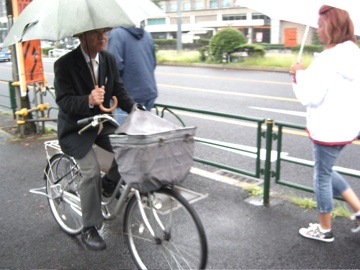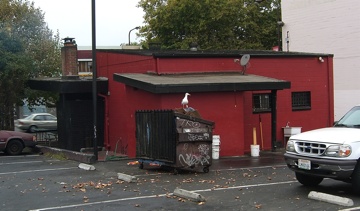On rare occasions, I’ll see a cyclist in Berkeley try this: riding a bike while holding an umbrella. I saw dozens of people doing so with seeming ease today. This guy was negotiating his way past a tour group on a sidewalk outside the Imperial Palace. Elsewhere, I saw a woman whose bike appeared to be fitted with an umbrella holder–a unit that also incorporated a headlight.
Getsuyobi
Today (Monday, though we’ve already crossed into Tuesday where I’m sitting), we took a round trip from Tokyo Station to Nagoya on the Shinkansen–the “bullet train.” The distance is about 340 kilometers one way–about 210 miles–and the trip each way took about two hours.
On the Nagoya end of the journey, we took a local train and subway out to the eastern suburbs to visit the Hattori family, who through some daring and generous impulse decided to take in a foreign exchange student in 1976. For me, it was an amazing and revealing day; in a sense, I got a chance to revisit not only the place and people, but unexpectedly to get a look at that long-ago self. Who was that bearish, bearded, wild-haired young gaijin?
And with that question, I’m signing off. It’s just too late tonight to both reflect on the day and write it. I will mention, though, that Kate and I simply couldn’t have had the day we had, or the trip we’ve had so far, without Eamon and Sakura. Their knowledge of the place, which can be so daunting to foreigners, has allowed us to relax in a way that I know I never could if I were doing this on my own. And Eamon’s language skills–astounding.
It’s bed time. O-yasumi nasai.
Technorati Tags: japan
Far Side of the Weekend

In the Kanda district, Sunday night, about 8 p.m., and things are sedate by any big city’s standards. We’re getting up early to take a long-ish train ride down to Nagoya, where we’ll meet the Hattoris, the family I stayed with when I was here as a student in 1976.
For today I’ll only say that I’ll never get used to the experience of getting on a flight one day (we left San Francisco about 1:30 p.m. Saturday) and disembarking well into the next (we landed in Narita, north of Tokyo, at 4:30 p.m. Sunday). It’s way, way past my bedtime (5 a.m. Sunday morning in Berkeley), but just 9 at night here. I’m ready to turn in.
Japan
Now it can be told: Later today, we’re flying off to Japan for a week. Main mission: to meet my son Eamon’s wife Sakura’s family (got that?). For Illinois readers: They live north of Tokyo about the same distance that Zion is north of Chicago (45 miles, say). We’re going to a hot spring. We’re going to eat great food, and I’ll probably drink sake. I’m going to try not to make too much of a fool of myself.
Other itinerary items: We’re going to ride the Shinkansen (what we call the bullet train) to Nagoya to visit g the family I lived with for four months in 1976. Also: Eamon and Sakura are going to show us around Tokyo, which I have only the barest impressions of from that long-ago visit. And finally: I’m going to watch Kate take it all in.
Pictures and stories to come.
Taking Care of Them
John McCain, tonight: “I know the veterans. I know them well. And I know that they know that I’ll take care of them. And I’ve been proud of their support and their recognition of my service to the veterans. And I love them. And I’ll take care of them. And they know that I’ll take care of them. And that’s going to be my job.”
Andrew J. Bacevich, last month: “Yeah. Well, my son was killed in Iraq. And I don’t want to talk about that, because it’s very personal. But it has long stuck in my craw, this posturing of supporting the troops. I don’t want to insult people.
“There are many people who say they support the troops, and they really mean it. But when it comes, really, down to understanding what does it mean to support the troops? It needs to mean more than putting a sticker on the back of your car.
“I don’t think we actually support the troops. We the people. What we the people do is we contract out the business of national security to approximately 0.5 percent of the population. About a million and a half people that are on active duty.
“And then we really turn away. We don’t want to look when they go back for two or three or four or five combat tours. That’s not supporting the troops. That’s an abdication of civic responsibility. And I do think it – there’s something fundamentally immoral about that.
“Again, as I tried to say, I think the global war on terror, as a framework of thinking about policy, is deeply defective. But if one believes in the global war on terror, then why isn’t the country actually supporting it? In a meaningful substantive sense?
“Where is the country?”
Technorati Tags: iraq
Park Bench

Live Oak Park, on North Shattuck Avenue in Berkeley, earlier this week. We don’t walk through this park much, but the other day we strolled through on the way home from an errand (see Peet’s bag on bench). It’s an angsty teen mini-essay dated last month. I think virtually the entire text is legible if you click the image for the larger versions.
Just One Thing About That
And now a word about The Campaign: John McCain has decided that our economy is so strong that he needs to leave the campaign trail to make it stronger. It would be unseemly to put Country Second and indulge in something so vulgar as politics by debating his opponent. Stop for a moment and admire McCain for trying to execute a clever political gambit by trying to haul himself above the muck of politics for a moment. Then consider the election-year crises that the country has come through while candidates carried on their campaigns:
2004: The whole Iraq endeavor coming undone.
1992: Economic recession.
1980: The Iran hostage crisis.
1968: Intensified fighting in Vietnam, assassination of leading national figures.
1964: Nation in turmoil over civil rights campaign in the South.
1952: Korean War.
1944: World War II.
1940: World War II.
1936: The Depression.
1932: The Depression.
1916: World War I.
1864: Civil War.
1860: Slavery/disunion crisis.
1856: National coming apart at seams over slavery.
1812: War with Britain.
Gee, we managed to have an uninterrupted campaign during 1864? When the nation was sufferiing through an appallingly bloody series of battles? You mean Lincoln didn’t try to put a hold on politics while trying to fulfill his duties as commander-in-chief? Neither world wars nor economic calamity put campaigns off the rails? Stunning.
The history shows what an empty gesture McCain’s move is. Obama got it right when he said that this is exactly the moment when the candidates need to be in front of the people.
The $25,000 Solution
As I’ve made annoyingly clear to most of my friends and acquaintances–the people who stand still long enough to hear me say a full sentence before looking for a safe exit–I have a simple, elegant answer to many of the intractable ills that plague America: poverty, a failing educational system, crime, the illicit drug trade, stagnant inner-city economies, the obesity epidemic.
Here it is: Let’s give $25,000 in cash, no strings attached, to each and every American who lives below the federally set poverty line (and no, I don’t care what your papers say: if you’re here, you’re an American). It’s a yearly payment until you don’t qualify anymore (and no, the payment does not count as income and wouldn’t disqualify you; only earnings independent of the poverty stipend count to get you out of poverty and off the program. We’re talking about cold, hard cash here: no bureaucrats wanted, no social engineers need apply for a grant.
I can hear the peals of outrage: You mean, just give all those poor people all that money? Just GIVE it to them? That’s crazy! They’ll spend it all on crack!
I answer unruffled: It may be nuts. And some of that nicely redesigned cash may be spent unwisely. But what we’re administering is the only weapon that’s proof against all the problems mentioned above. When confronted with difficulty, doubt or obstacles of any sort, the affluent in America utter slogans about values and steadfastness. As their words die on the wind, they wheel in their trusty artillery: the credit accounts and cash reserves. Meantime, we bleed little dribbles of cash into the lives of the poor, and all it does is keep them poor. Their poverty and all that accompanies it, from lousy health care to crappy schools, is tolerated with a wink of concern and a nod to reform, and little, very little, changes. It’s not that we don’t mean to do better. We do. Millions of people far better than me have dedicated their lives to improving life for others. I just think it’s time the rest of us, through our gigantic government ATM machine, got into the act.
Don’t think about the downside for the moment–where in the world will we get all that money?–think about the upside: First of all, an economic stimulus that would have groceries and big-box stores and banks and other services the rest of us take for granted fighting to get into neighborhoods they’ve shunned for generations; that stimulus would also have a far-reaching impact in creating new government revenue. Second, removing the principal motive and driver for most inner-city crime. Third, giving the have-nots some real clout about where they send their kids to school. Fourth, providing resources for community self-improvement projects.
Now about the cash. Spending that kind of dough should give us pause. Some recent statistics show that 37 million Americans live below the federal “poverty line.” Let’s round up to 40 million, since things haven’t gotten any easier in the year and a half since those numbers came out. Now if we gave each of our less fortunate fellow citizens 25 grand apiece–everyone in the family gets a payment, even the kids and the ex-cons who never graduated eighth grade–that comes to $1 trillion.
But where there’s a will, there’s a way. Over the last five or six years, we’ve been reminded of that repeatedly, especially when it comes to the government and money. Iraq: $550 billion and counting (that amounts to a $25,000 payment to every Iraqi–even the ones who don’t love us). The negative economic impact over the next generation is forecast to be as much as $3 trillion. Bush tax cuts: the total number is so high it will make your nose bleed, but the yearly cost if they’re made permanent is expected to be $400 billion. Then there’s the Year of the Bailout. It’s getting hard to keep track, but off the top of my head: $30 billion for Bear Stearns; Fannie Mae/Freddie Mac: $200 billion; Great Bailout of Ought-Eight: at least $700 billion. I feel like I’m forgetting a couple hundred billion somewhere.
Now, the architects of our tax cuts, wars, and financial mega-rescues say roughly the same thing in defending their handiwork: it’s all necessary for our prosperity, well-being, and national survival. I’ll make the same claim for my $25,000 Solution: It’s a prescription for the economic and social ailments that beset not only the 40 million people who live in poverty, but for the entire society that has failed in its efforts to address those ailments.
And really, after the Bush years, what could it hurt to try?
Technorati Tags: politics




